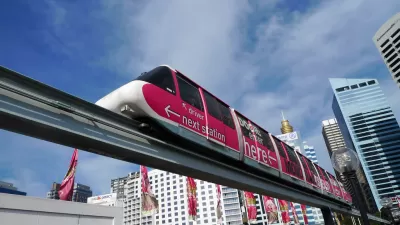According to Yonah Freemark, there's folly in the way the federal government has been funding rail transit projects but failing to set standards for minimum service—a key indicator of transit ridership success.
Yonah Freemark introduces a discussion of transit service standards by citing the example of Salt Lake City's S-Line rail transit project. The project was built at costs competitive with bus rapid transit but has delivered only a third of the projected ridership.
According to Freemark, "providing new rail lines isn’t enough – service standards really matter when it comes to attracting people to use transit. And on that front, too many transit agencies around the country are failing to offer the services people can rely on."
Freemark goes on to point out that, while the Federal government has been funding the majority of recent streetcar and light rail projects, they've also failed "to enforce any sort of minimum level of service." More specifically, "[rather] than mandate that new services funded through grants offer service at least every 15 minutes, for example, the Federal Transit Administration simply requires agencies to 'develop quantitative standards for all fixed route modes of operation' for issues like vehicle headway. In other words, if a transit agency provides service every three hours on a just-built rail line, that’s fine — as long as that information has been submitted in triplicate to Washington in advance."
FULL STORY: A Call for Minimum Service Standards

Trump Administration Could Effectively End Housing Voucher Program
Federal officials are eyeing major cuts to the Section 8 program that helps millions of low-income households pay rent.

Planetizen Federal Action Tracker
A weekly monitor of how Trump’s orders and actions are impacting planners and planning in America.

The 120 Year Old Tiny Home Villages That Sheltered San Francisco’s Earthquake Refugees
More than a century ago, San Francisco mobilized to house thousands of residents displaced by the 1906 earthquake. Could their strategy offer a model for the present?

HSR Reaches Key Settlement in Northern California City
The state’s high-speed rail authority reached an agreement with Millbrae, a key city on the train’s proposed route to San Francisco.

Washington State Legislature Passes Parking Reform Bill
A bill that would limit parking requirements for new developments is headed to the governor’s desk.

Missouri Law Would Ban Protections for Housing Voucher Users
A state law seeks to overturn source-of-income discrimination bans passed by several Missouri cities.
Urban Design for Planners 1: Software Tools
This six-course series explores essential urban design concepts using open source software and equips planners with the tools they need to participate fully in the urban design process.
Planning for Universal Design
Learn the tools for implementing Universal Design in planning regulations.
Ada County Highway District
Clanton & Associates, Inc.
Jessamine County Fiscal Court
Institute for Housing and Urban Development Studies (IHS)
City of Grandview
Harvard GSD Executive Education
Toledo-Lucas County Plan Commissions
Salt Lake City
NYU Wagner Graduate School of Public Service





























